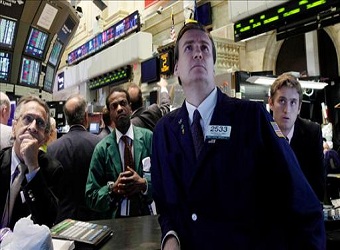Stocks closed flat Friday as investors parsed through a mixed employment report, a U.S. airstrike in Syria and comments from a top Federal Reserve official.
Talking at the Princeton Club of New York, New York Fed President William Dudley said the U.S. should consider small adjustments to the Dodd-Frank law, which toughened oversight for financial institutions.
“No one wants to be on the wrong side of this deregulation trade,” said Nick Raich, CEO of The Earnings Scout. The prospects of deregulation have been a boon for equities since the U.S. election.
Dudley also said there might only be a slight pause in the Fed’s plan to normalize rates if the central bank starts unwinding its massive $4.5 trillion balance sheet. The benchmark 10-year yield traded near 2.37 percent in the afternoon.
The Dow Jones industrial average closed about 6 points lower, with Goldman Sachs and DuPont contributing the most losses. The S&P 500 fell 0.1 percent, with consumer staples leading advancers and utilities lagging. The Nasdaq composite fell marginally.
“It’s certainly interesting that the market didn’t have a more significant drop-off,” said Adrian Day, CEO of Adrian Day Asset Management. “When people are positive and stocks are going up, it takes a lot to knock the market off.
On the data front, the U.S. economy added 98,000 jobs last month, well below the expected gain of 180,000. The unemployment rate fell to 4.5 percent from 4.7 percent. Wage growth was not as strong either, with average hourly earnings up by 2.7 percent on an annualized basis.
“It is certainly the most unusual jobs report I’ve seen in a while,” said Scott Clemons, chief investment strategist at Brown Brothers Harriman. “There was something for everybody.”
Futures and Treasury yields slipped after the jobs report was released, with the 10-year note yield briefly dipping below 2.3 percent to hit its lowest level since late November.
“Investors are taking this as a sign they should be a little more cautious in their portfolios,” said Kate Warne, investment strategist at Edward Jones. “While the headline payroll was considerably weaker, it was more of a mixed report when you look at the other components.”
Investors were also contending with a U.S. airstrike in Syria, which sent 59 Tomahawk missiles Thursday night.
The missiles targeted the Shayrat air base near Homs, and were in response to a Tuesday chemical weapons attack. Officially announcing the strike, President Donald Trump said the targeted airfield had launched the chemical attack on a rebel-held area, and he called on other nations to oppose Syria’s embattled leader.
Overnight, Dow futures tumbled around 100 points, but managed to retrace most losses.
“The military response last night was in keeping with what the U.S. has done in the past,” said Brown Brothers’ Clemons. “I think that’s giving the market some comfort for now. But if the situation escalates, … that could bee a negative for sentiment in the market.”
Trump ordered the airstrike as he met with Chinese President Xi Jinping at Mar-a-Lago in Florida.
The U.S. dollar rose 0.48 percent against a basket of currencies, with the euro near $1.059 and the yen around 111.21.
“Every time there is an international event, there is a flight to safety and the dollar is seen as a safe haven,” said Minh Trang, senior FX trader at Silicon Valley Bank. “That’s why, even after a pretty lousy jobs number, you’re seeing the dollar hold its ground.”
Other data released Friday included wholesale inventories, which rose 0.4 percent. The Atlanta Fed also slashed its first-quarter GDP forecast to 0.6 percent from 1.2 percent, citing weak car sales, among other factors.
The Dow Jones industrial average fell 6.85 points, or 0.03 percent, to close at 20,656.10, with DuPont leading decliners and Wal-Mart outperforming.
The S&P 500 slipped 1.95 points, or 0.08 percent, to end at 2,355.54, with utilities leading six sectors lower and consumer staples the biggest advancer.
The Nasdaq composite fell 1.14 points, or 0.02 percent, to close at 5,877.81.
Decliners were a step ahead of advancers at the New York Stock Exchange, with an exchange volume of 752.50 million and a composite volume of 3.037 billion at the close.
The CBOE Volatility Index (VIX), widely considered the best gauge of fear in the market, traded near 12.75.
Source: CNBC



